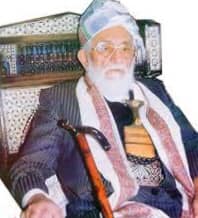Sheikh Sinan Abdullah Abu Lahoum died
by: Abduljabbar Hussein Aldhufri
An overview of the life of the late Sheikh Sinan Abdullah Abu Lahoum, in the protection of God Almighty
He moved to the mercy of God Almighty Sheikh Al-Fadl Sinan Abdullah Abu Lahoum, this Saturday at the age of 99, after a long suffering with illness and has witnessed the late deceased’s life and his participation in the most important and prominent political events that Yemen has lived through.
Sheikh Abu Lahoum was one of the most prominent symbols of the republic and one of the great sheikhs of Bkayl and Yemen. He participated in the revolution against the rule of the Imamate, and he had a rich and exciting biography.
The deceased hails from the town of "Nehm", east of Sanaa, and lived in the area of Waraf in Ibb governorate, and held several positions during the republic's era, the last of which was during the reign of President Al-Hamdi, then he resigned from government work.
His full name is Sinan Abdullah Saleh Yahya Ahmad Abu Lahoum, he was born in Nehm in the village of Wadi al-Malah in 1922, and grew up under the care of his father, and began his studies in the village mosque with a native teacher, and at the age of ten, Imam Yahya Hamid al-Din took him as a hostage in the palace of (happiness) In the city of Sana'a, to ensure the loyalty of his tribe, he remained a hostage for five years.
After the death of his father in 1955, he traveled to the town of Nehm, and the people chose him as an elder over them to succeed his father, whom Imam (Yahya) used to call: (the patron saint of criminals) because of what he intercedes for him.
During the days of Imam Ahmad, he immigrated to the city of Aden in the late 1950s, and continued to work with the opposition against the imam’s rule until 1961, then he moved to Cairo, Egypt, and met with the revolutionaries opposed to the imam, including Muhammad Mahmoud al-Zubairi, Ahmed Muhammad Numan, and others.
Then he returned to the city of Aden, in 1962, and he almost settled there until the British authorities informed him that they were not satisfied with his stay in the city of Aden, and gave him one week to leave.
He was appointed Yemen's ambassador to China, and he was forced to reside in the Egyptian capital with a number of revolutionaries in the mid-sixties, then he was appointed as a member of the Yemeni Presidency Council, consisting of 30 members, including sheikhs and officers, then he was appointed Minister of Agriculture, and he was excluded from the government after his relationship with President Sallal was strained.
He left for Saudi Arabia with a number of opponents of President Sallal's rule, then returned to the city of Hodeidah, and met the revolutionaries who led the movement to overthrow the Basil and take over President Abdul Rahman Al-Eryani in 1967.
After that, he was appointed governor of Hodeidah governorate until 1974, then he resigned from his job, and was appointed as assistant to President Ibrahim Muhammad Al-Hamdi for financial affairs.
Sheikh Sinan Abu Lahoum has books, most notably: Yemen Facts and Documents, issued in two parts by the Al-Afif Cultural Foundation (Memoirs).
He participated in important political events, including: the (Imran) conference, which Muhammad Mahmoud Al-Zubairi called to hold, and he read the conference statement against the Egyptian military and administrative intervention.
He also attended the Sudan conference in 1967 called by Sudanese President Rifat Al-Mahjoub to discuss the Yemen issue.
And he participated in the reconciliation conference between the two parts of Yemen, headed by the two presidents: Ali Abdullah Saleh and Abd al-Fattah Ismail, and his position was against the war between the two parts of Yemen in 1979.
He also attended the signing of the declaration of the return of Yemeni unity at the Maasheeq Palace in Aden in 1990.
The late Sinan Abu Lahoum was famous for implementing and establishing many charitable projects in Yemen.
The mercy of God Almighty overlooks, and we belong to God and to Him we shall return.














No comments:
Post a Comment